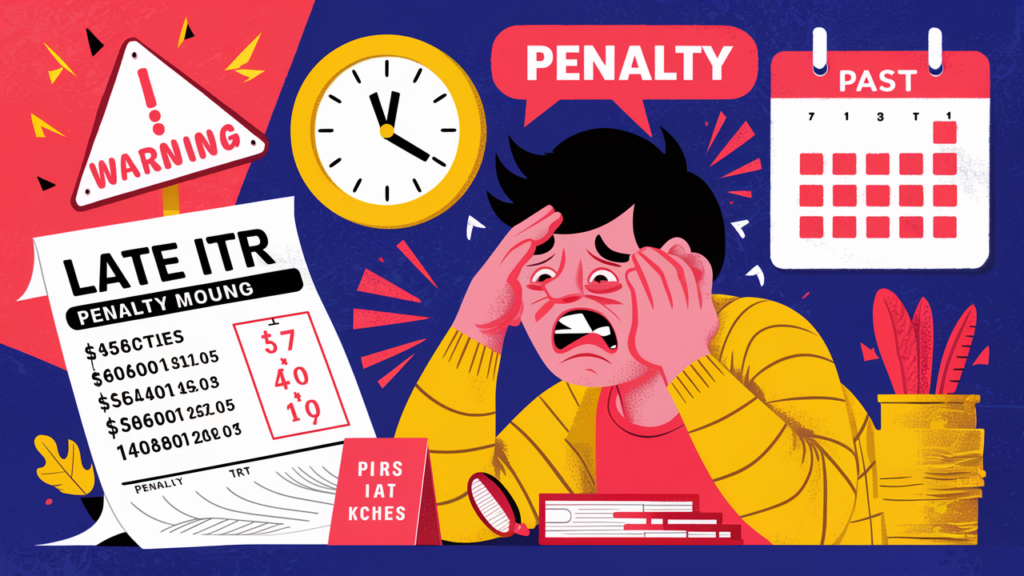What are the consequences of filing a late TAX return?
- Late filing of Income tax return will attract Section 234F, in which a penalty of Rs. 1,000 is imposed if the assessee’s taxable income is less than or equal to Rs.5,00,000 and Rs.5,000 for taxable income above Rs. 5,00,000.

- Interest at the rate of 1% per month (Section 234A) on the outstanding amount of tax will be levied.
- Delay in refund if there is any excess tax paid.
- Interest on refund @ 0.5% per month won’t be provided by the department.
- Losses incurred during the financial year cannot be carried forward to set off the taxable incomes for the future assessment years to reduce the tax liability in future
- Taxpayers must ensure that they file their income tax returns by the due date of July 31st(Individual & HUF ). Failure to meet this deadline will result in the new regime automatically being applied, as the option to choose the old regime will no longer be available for late filings and deduction under Chapter VI of the Income Tax Act 1961.
For filing of Income tax return: Income Tax Portal
Filing Income Tax Returns (ITR) is essential for several reasons:
- Compliance: Filing ITR is a legal obligation and a requirement under the Indian Income Tax laws. Failure to file ITR can result in penalties, interest, and prosecution.
- Record Keeping: Filing ITR helps maintain a record of a company’s income and taxes paid, which can be helpful for future reference and for availing tax benefits.
- Claim Refunds: If a company has paid more taxes than required, it can claim a refund by filing its ITR.
- Loan and Visa Applications: Filing ITR is often a requirement when applying for loans, visas, or opening a bank account. It demonstrates the company’s financial stability and income.
- Maintaining Good Standing: Filing ITR on time helps maintain a good reputation and demonstrates the company’s commitment to compliance and transparency.
- Obtaining tax clearance certificates : For foreign or high-value transactions, mainly for the sales and transfer of certain assets, a person is required to provide a tax clearance certificate under Section 281 of the Act. One who files a regular ITR only can obtain the tax clearance certificate.
- Eligible for government tenders : Income Tax Returns for the last few years are considered to be crucial if one intends to undertake any government projects by tender filing. Therefore, regular ITR makes one eligible for such important tenders.
- Filing ITR is essential for maintaining compliance, availing tax benefits, and maintaining a good reputation for the company.
You must file an ITR under the following circumstances:
- If your total income exceeds the tax-free threshold based on your age.
- When seeking an income tax refund.
- If you’ve earned from or invested in foreign assets during the fiscal year.
- For companies or firms, regardless of profit or loss.
- If you’ve incurred losses in business/profession or under capital gains and wish to carry them forward to subsequent years.
- You deposited more than ₹1 crore in one or more current accounts with a bank or co-operative bank.
- You spent more than ₹2 lakh on travel to a foreign country for yourself or anyone else.
- You spent more than ₹1 lakh on electricity.
- Your total sales, turnover, or gross receipts in business exceeded ₹60 lakhs.
- Your total gross receipts in profession exceeded ₹10 lakhs.
- The aggregate of Tax Deducted at Source (TDS) and Tax Collected at Source (TCS) during the year was ₹25,000 or more. However, if you are a resident individual aged 60 years or more at any time during the year, you need to file a return only if the aggregate of TDS and TCS is ₹50,000 or more.
- You deposited ₹50 lakhs or more in one or more savings bank accounts.
FAQs
What documents do I need to file ITR-1?
You would need to download AIS and keep copies of Form 16, house rent receipt (if applicable), investment payment, premium receipts (if applicable). However, ITRs are annexure-less forms, so you are not required to attach any document (like proof of investment, TDS certificates) along with your return (whether filed manually or electronically). However, you need to keep these documents for situations where they need to be produced before tax authorities such as assessment, inquiry, etc.
How do I know which ITR I need to file?
Different tax returns are prescribed for filing by individual taxpayers depending on their source of income and residential status. To determine the correct ITR to file, you can use the Help me decide which ITR Form to file option. You can then proceed based questions displayed to you to determine the correct ITR form to file.
Is the new tax regime a default regime?
Yes. From AY 2024-25, the new tax regime will be the default option. Every year, you must select between the old and new tax regimes for that particular Assessment year.
Whether all deductions will be available to claim while filing ITR-1 return?
Yes, all deductions will be available to claim in the return once taxpayer will change the option of default new tax regime to old tax regime by selecting the below question as ‘Yes’ under Personal Information in return.
Do I need to file returns if tax has been deducted by my employer / bank
Yes, employers and banks deduct tax at source on salary and interest income respectively. You still need to disclose the income on which tax has been deducted and claim credit for TDS in the Income Tax Return.










Great article! as a tip I found this Income tax calculator tool very useful https://mate.tools/income-tax-calculator 🙂